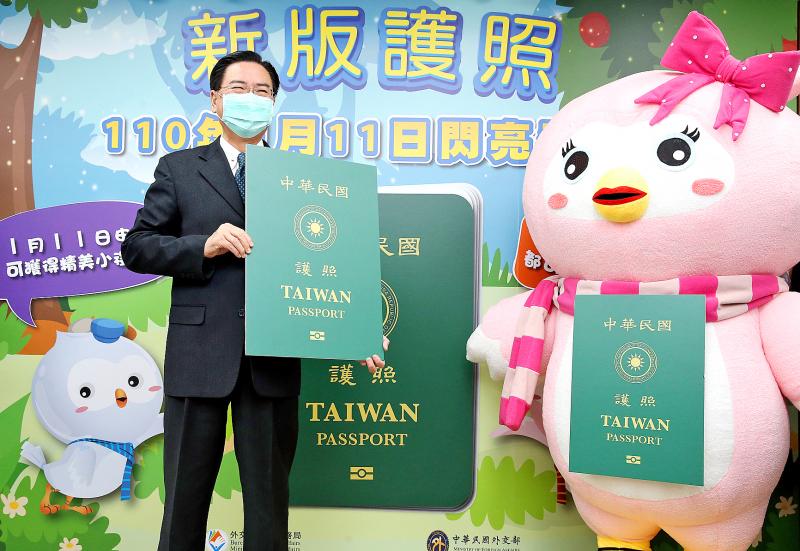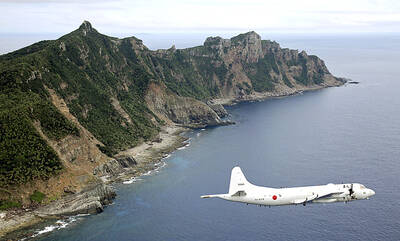Lawmakers and officials were among the people who lined up early yesterday to apply for the redesigned passports, which prominently display the word “Taiwan,” while minimizing the English name “Republic of China” (ROC).
Nearly 300 people applied for passports at the Bureau of Consular Affairs in Taipei, where Minister of Foreign Affairs Joseph Wu (吳釗燮) watched over the process.
Wu said he was happy to see the high level of enthusiasm for the passports, and reiterated that other nations, airlines, the International Air Transport Association and relevant agencies have been notified of the change to ensure a smooth transition.

Photo: CNA
There would be no problems using the passports, Wu said, inviting those whose passports are expiring soon, as well as anyone who is interested, to apply.
People in Taichung began lining up at the Ministry of Foreign Affairs’ local office before 7am, and by 8:30am, the line was snaking out the door.
Executive Yuan Central Taiwan Joint Services Center Deputy Director Hung Chun-yi (洪宗熠) was among the applicants, many of whom said they wanted to apply even though their passports did not expire soon.
More than 10 people arrived early at the ministry’s office in Hualien, saying they could not wait for the COVID-19 pandemic to be over so they could use their new passports to travel.
Before the pandemic, the Hualien office issued 70 to 80 passports per month, but in the past year had not reached even 10 most months, the ministry said.
A Hualien resident surnamed Hsiao (蕭) said that they waited to change their passport, even though their old one expired in August last year.
The new design is simple and tasteful, especially the prominent “Taiwan,” Hsiao said.
Among the applicants in Taipei was Taiwan Statebuilding Party Legislator Chen Po-wei (陳柏惟), who not only showed up early, but also paid for priority processing to get his passport in two or three days, as opposed to the usual four.
“Changing the passport cover is a small step, but letting the world recognize and see Taiwan is extremely moving,” he said.
The Legislative Yuan passed the proposal to emphasize “Taiwan” over “ROC” with 66 votes for and none against, he said, thanking his colleagues for the cross-party effort.
He was happy to give this small gift to Taiwanese on the one-year anniversary of his election, he added.
Asked about the retention of the ROC name in Chinese characters, Chen said that no matter a person’s ideology, the name causes confusion internationally, sometimes even endangering Taiwanese.
The redesign is a manifestation of national sovereignty, identity and pride, and is worth feeling proud of, he added.
However, Chen said he still longs for the day he can officially say: “This is Taiwan. We are Taiwanese.”
People can apply for a new passport at the bureau office in Taipei, a local foreign ministry office or at a representative office abroad.
The cost remains unchanged: NT$1,300 for applicants aged 14 or older and NT$900 for children under 14.
Additional reporting by Su Chin-feng and Wang Chun-chi

MISINFORMATION: The generated content tends to adopt China’s official stance, such as ‘Taiwan is currently governed by the Chinese central government,’ the NSB said Five China-developed artificial intelligence (AI) language models exhibit cybersecurity risks and content biases, an inspection conducted by the National Security Bureau (NSB) showed. The five AI tools are: DeepSeek, Doubao (豆包), Yiyan (文心一言), Tongyi (通義千問) and Yuanbao (騰訊元寶), the bureau said, advising people to remain vigilant to protect personal data privacy and corporate business secrets. The NSB said it, in accordance with the National Intelligence Services Act (國家情報工作法), has reviewed international cybersecurity reports and intelligence, and coordinated with the Ministry of Justice Investigation Bureau and the National Police Agency’s Criminal Investigation Bureau to conduct an inspection of China-made AI language

LIMITS: While China increases military pressure on Taiwan and expands its use of cognitive warfare, it is unwilling to target tech supply chains, the report said US and Taiwan military officials have warned that the Chinese People’s Liberation Army (PLA) could implement a blockade within “a matter of hours” and need only “minimal conversion time” prior to an attack on Taiwan, a report released on Tuesday by the US Senate’s China Economic and Security Review Commission said. “While there is no indication that China is planning an imminent attack, the United States and its allies and partners can no longer assume that a Taiwan contingency is a distant possibility for which they would have ample time to prepare,” it said. The commission made the comments in its annual

‘TROUBLEMAKER’: Most countries believe that it is China — rather than Taiwan — that is undermining regional peace and stability with its coercive tactics, the president said China should restrain itself and refrain from being a troublemaker that sabotages peace and stability in the Indo-Pacific region, President William Lai (賴清德) said yesterday. Lai made the remarks after China Coast Guard vessels sailed into disputed waters off the Senkaku Islands — known as the Diaoyutai Islands (釣魚台) in Taiwan — following a remark Japanese Prime Minister Sanae Takaichi made regarding Taiwan. Takaichi during a parliamentary session on Nov. 7 said that a “Taiwan contingency” involving a Chinese naval blockade could qualify as a “survival-threatening situation” for Japan, and trigger Tokyo’s deployment of its military for defense. Asked about the escalating tensions

DISPUTE: A Chinese official prompted a formal protest from Tokyo by saying that ‘the dirty head that sticks itself out must be cut off,’ after Takaichi’s Taiwan remarks Four armed China Coast Guard vessels yesterday morning sailed through disputed waters controlled by Japan, amid a diplomatic spat following Japanese Prime Minister Sanae Takaichi’s comments on Taiwan. The four ships sailed around the Senkaku Islands — known as the Diaoyutai Islands (釣魚台) to Taiwan, and which Taiwan and China also claim — on Saturday before entering Japanese waters yesterday and left, the Japan Coast Guard said. The China Coast Guard said in a statement that it carried out a “rights enforcement patrol” through the waters and that it was a lawful operation. As of the end of last month,